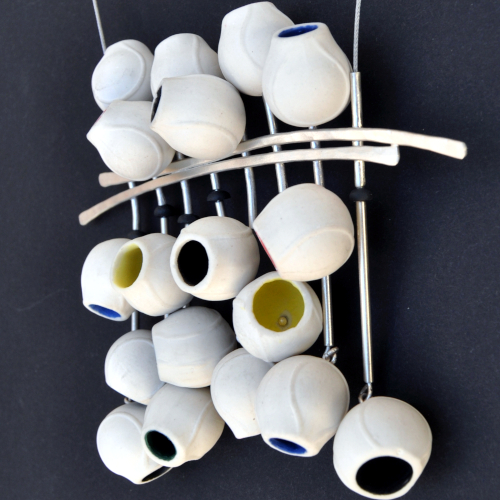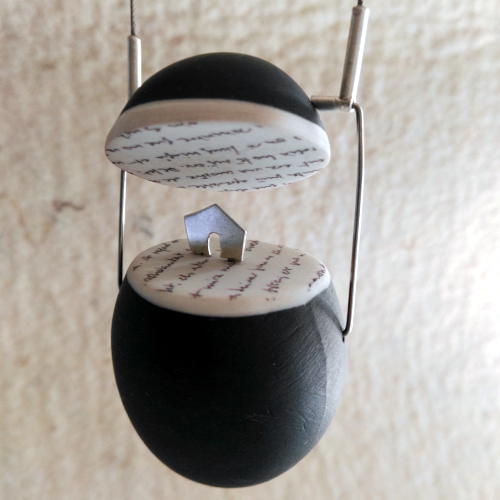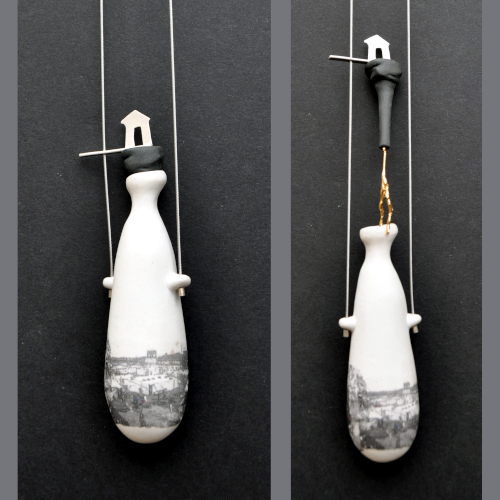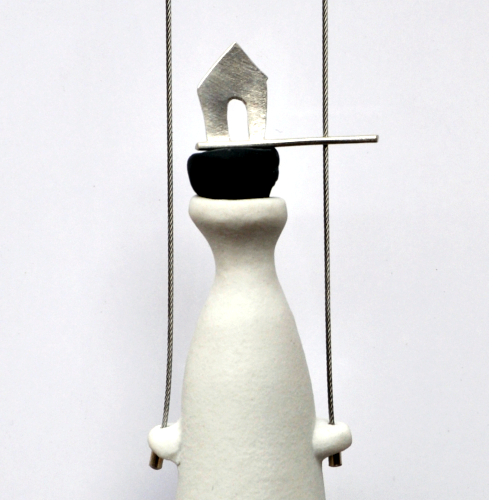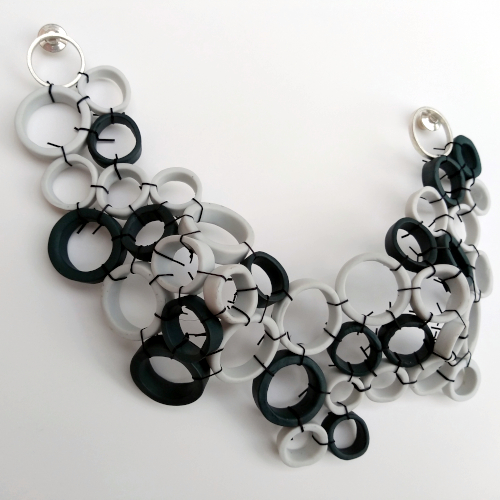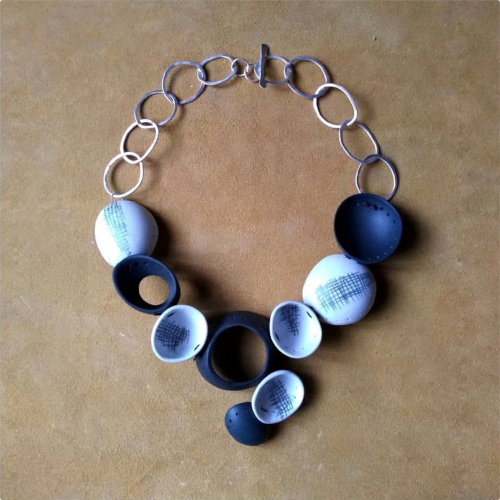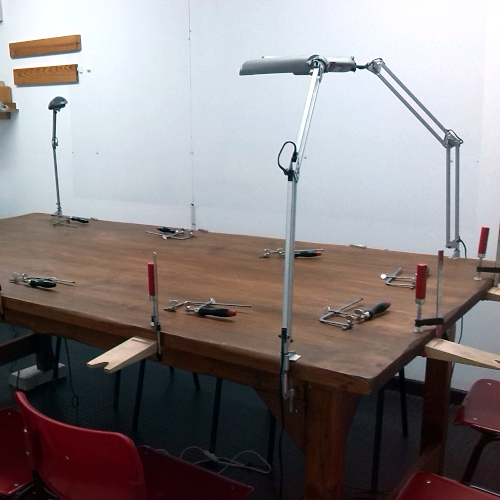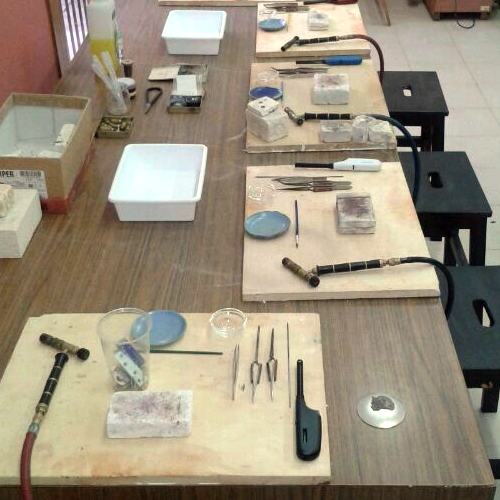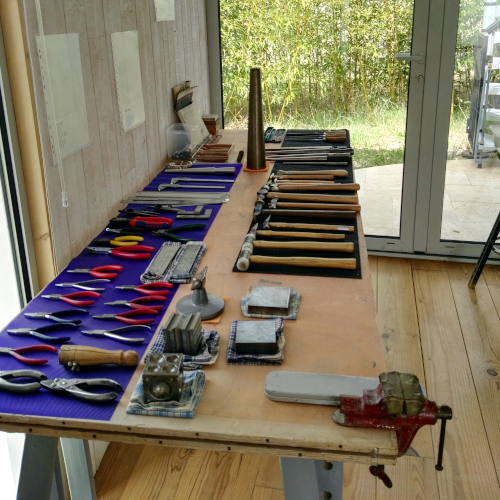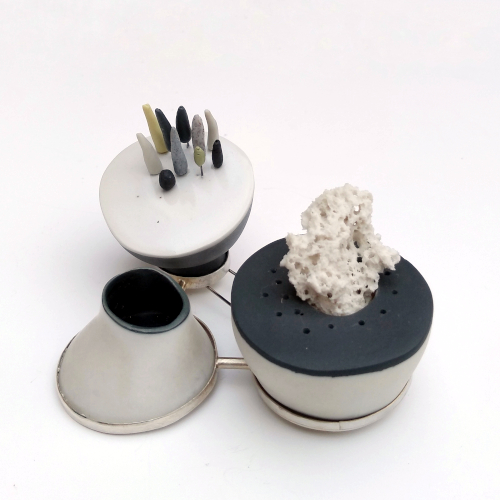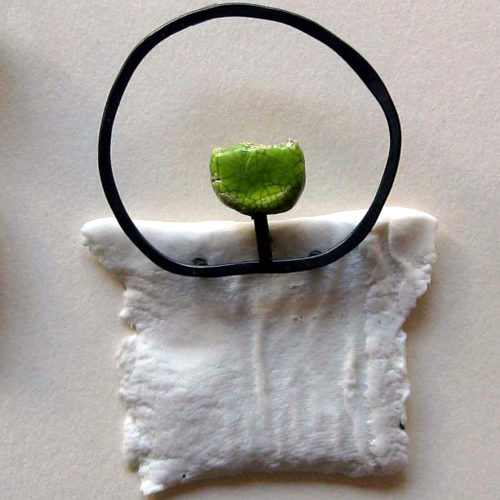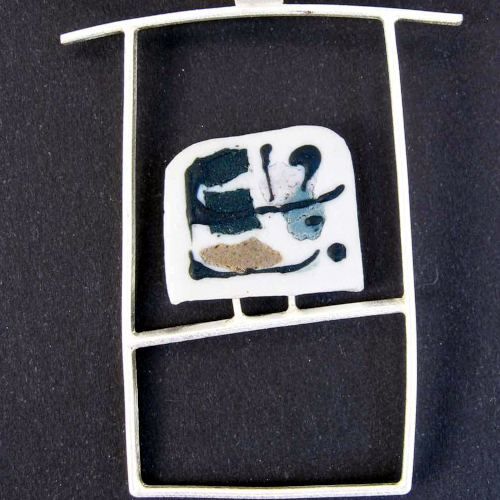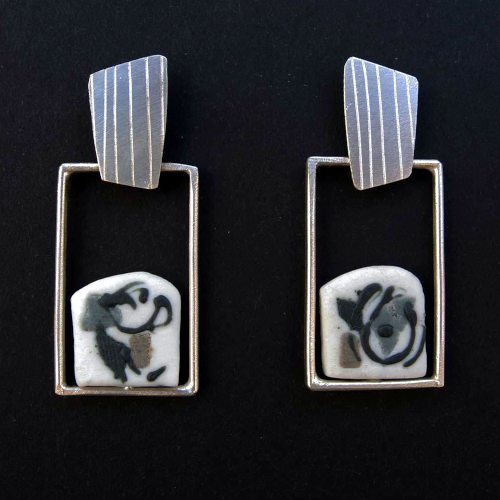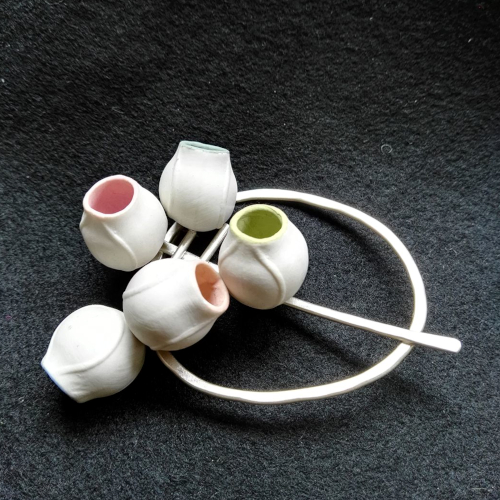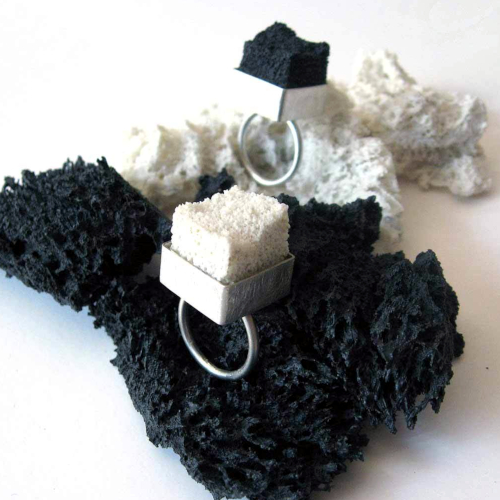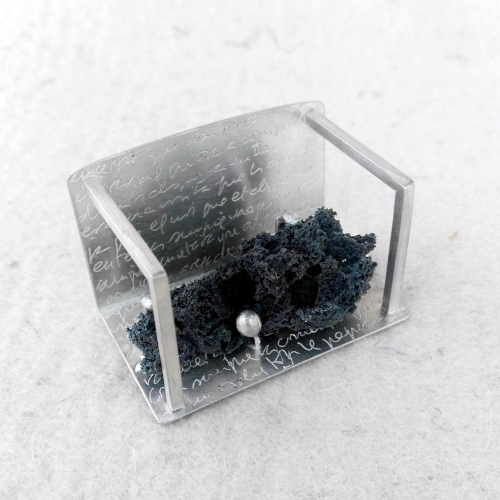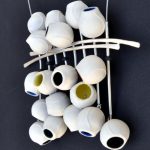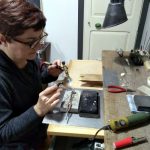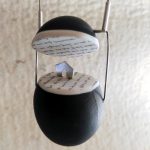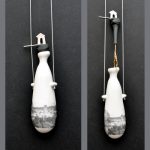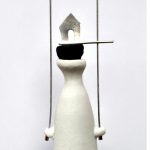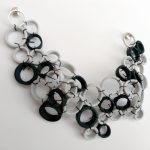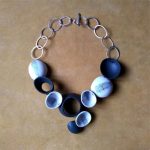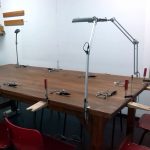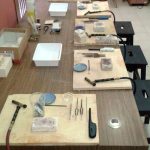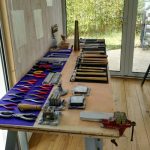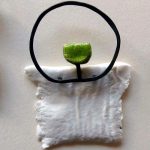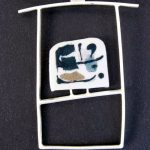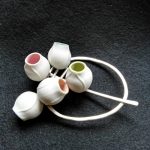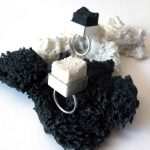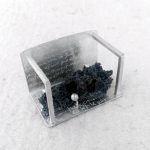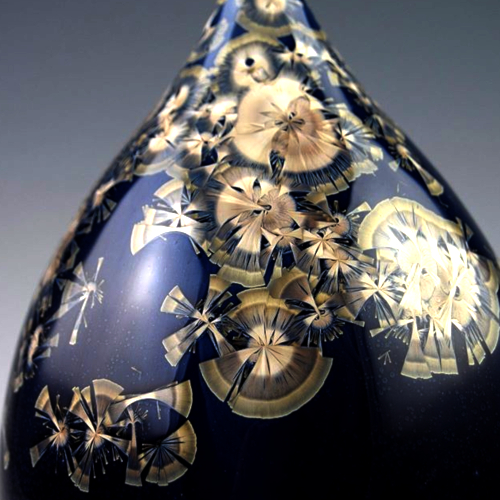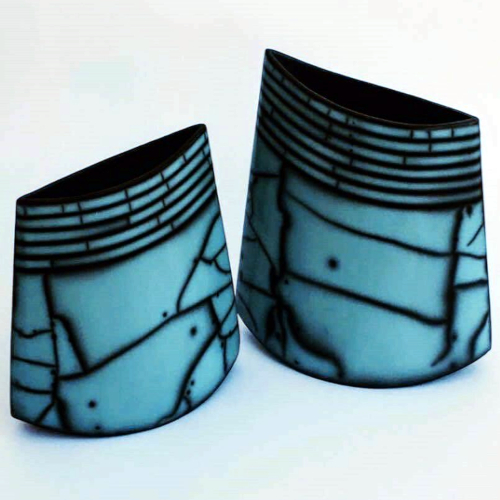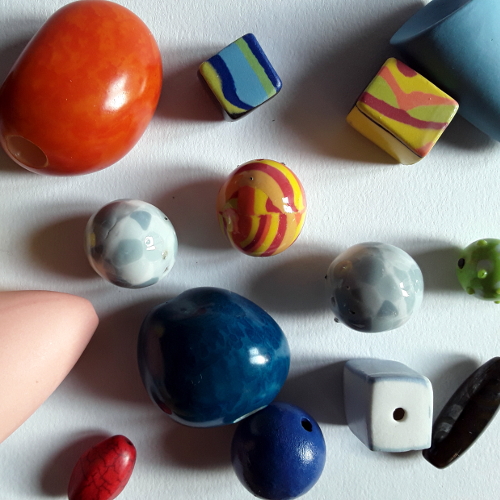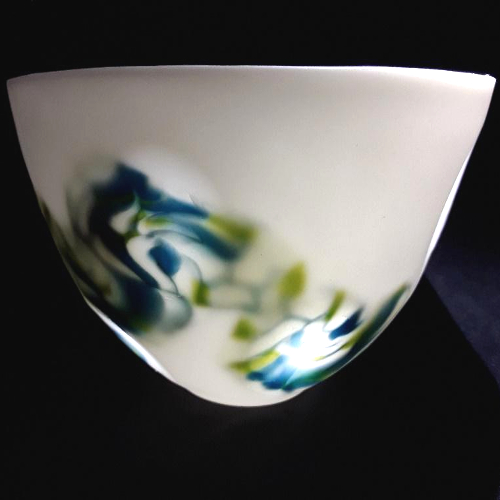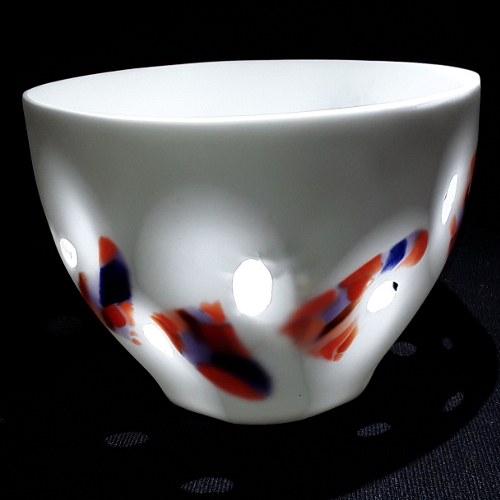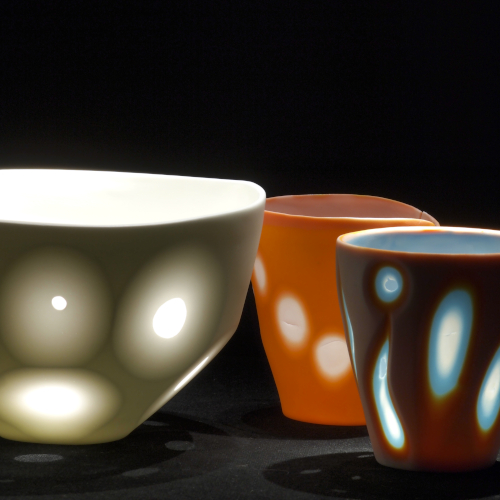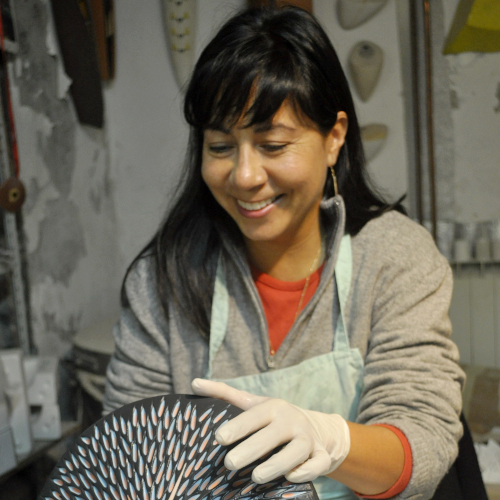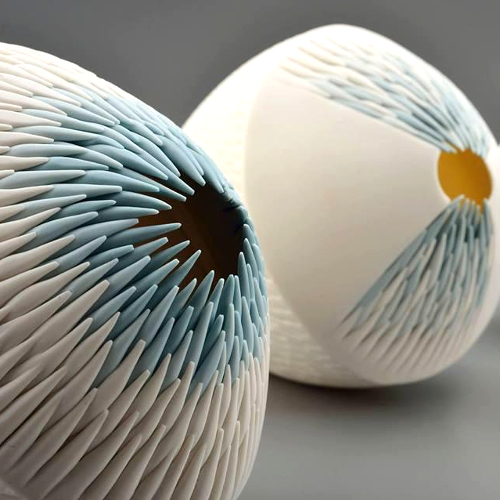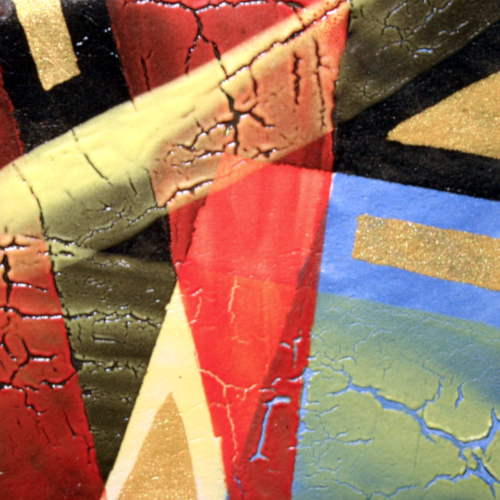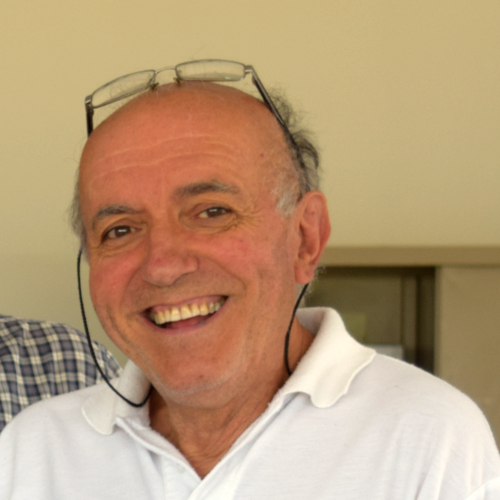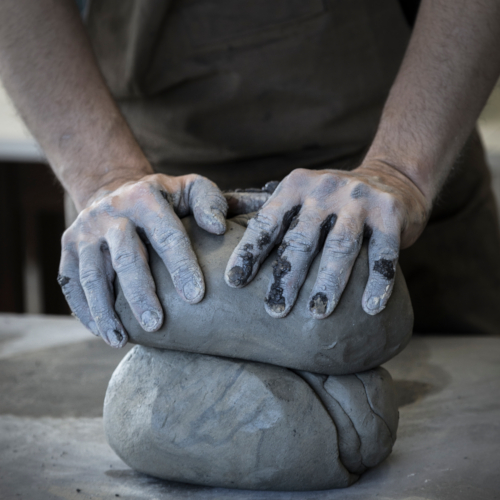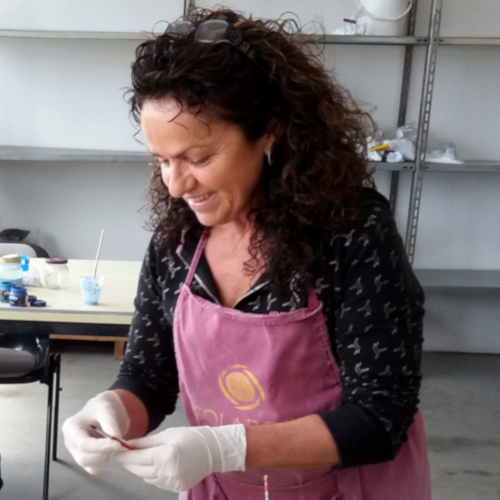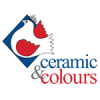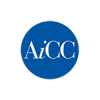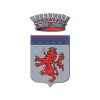JEWELRY TECHNIQUES APPLIED TO CERAMICS | Nuria Soley
13-14-15-16-17 March 2019
The main goal of this course is to learn the basics of metal work for creating ceramic jewelry, particularly porcelain. The course is essentially practical, based on experimentation with the main basic techniques of jewelry: measurements and marking, perforated internal and external, filing and polishing, firing, pickling, welding, etc. In a complementary way, some pieces of porcelain will be processed in order to practice assembly and final finishes. During the course, theoretical aspects on the characteristics and type of ceramic materials and metals will also be provided.
The workshop
Will be 5 days where you will face different practical exercises such as the creation of strips, wires and plates of metal, the learning of welding with silver, perforated, polishing, sanding, realization of the pieces in porcelain designed and fired and finally, assembled with the metal parts. The materials will be provided and each student will have his work table with the necessary equipment. Everyone can take home not only their knowledge but also their finished works.
Nuria Soley
Nùria Soley studied Design and Jewelry Technique at the school of Massana in Barcelona, and graduated in “Artes Aplicadas y Oficios Artísticos”, especialization in ceramics. He has made several solo and group exhibitions in Spain, France and the Netherlands. Known for her conferences, master classes and courses in Europe, especially at the Disseny School, Tàrrega, Spain and with the Terre Mediterranee Association of France. For many years she has participated in the European fairs and shows dedicated to jewelery and ceramics. She has received 3 international awards dedicated to the best installation in metal and ceramics and in jewelery: 2009 First prize “Ramon Barbat i Miracle” of Crafts in Catalonge. 2008 and 2007 in the International Fair of Marratxi, First and Second prize with the best installation.
The 35-hour workshop lasts from 9.00 to 17.00 on Wednesday, Thursday, Friday and Saturday and from 9.00 to 16.00 on Sunday.
Included in the Workshop cost:
35 hours of teaching | all the necessary materials | firings | nr. 5 brunch lunch | a box with the samples of the materials used during the workshop
Cost: 750.00 €
Teacher: Nuria Soley
Translator and assistant: Martha Pachon
Languages: English, Italian, French, Spanish
Download the presentation of Nuria Soley
Download the full program in pdf
To confirm your inscription you have to make a bank transfer of a deposit or the total
amount.
Related products
The Pearl, from the beginning to the end
22, 23 and 24 june 2018
A complex and complete course to make the artist independent of creating large and small series of pearls for jewelery in various shapes, sizes and decorations. Making of molds, testing of slip and body porcelain, firing and decoration.
The italian mold expert Florio Bedeschi will be in charge of the first part of the course for the execution of small molds for pearls of different shapes and sizes.
A second part related to the use of the mold with slip and body porcelain, to the firing and decoration, will be with Martha Pachón Rodríguez.
PROGRAM:
- Fully practical lessons with both teachers. - Preparation of the necessary materials for the construction of the mold. - Preparation of the plaster and its use in the making of the mold, preservation of the mold. - Use of slip and body porcelain with the plaster molds. - Methods of pearl decoration. - How to apply on molds, dry and fire avoiding deformations. - The pieces will be finished, decorated and fired.
Teachers: Martha Pachon and Florio Bedeschi Languages: English, Italian, French, Spanish
Download the application form in pdf Download the program in pdf
Translucent porcelain
17 and 18 March 2018
Transparency is one of the most important qualities of porcelain and usually, requires a prolonged, precise and very accurate processing to obtain a fine beauty piece highlighted by the translucenty. This course allows you to develop two simple and immediate techniques that will facilitate and strengthen creativity to develop many projects without the use of large resources and experience in the field of porcelain techniques. We will use slip porcelain without the use of molds and with a single-firing.
PROGRAM: Totally practical lessons, preparation of the material and basic forms. Use of slip porcelain and construction with two totally different techniques. Surface treatment, controlled drying and finishing. Methods to avoid deformation and breakage during the process and all the special features of the specific firing for this technique. Recover broken complex variations of the techniques and the surface with the use of color introduced into the slip the porcelain. Production of pieces to project in small series for use or decoration. pieces or cracks with specific recipe. Finally, more co. The 14-hour workshop lasts from 9.00 to 17.00 on Saturday and from 9.00 to 16.00 on Sunday. Teacher: Martha PachonJasper and Neriage
6, 7 and 8 April 2018
Two techniques distant in time and in geography, one technique, with slip porcelain and another with body porcelain, come together in a complex but fascinating technique with a wide variety of applications, from the unique piece to small series. To make the most of the potential of these techniques: Jasper and Nerikomi, the students will perform different exercises to get to know their fragility, strength and refinement. All the process and derivations for applications to different kind of objects, corrections of cracks, breakages and deformation.
Program: - Totally practical lessons with a theoretical chapter by technology. - Preparation of colored slip porcelain, recipe and percentages. - Preparation of colored body porcelain, recipe and percentages. - Creation of small pieces with different color combinations. - Methods of creating organic or geometric motifs. - Methods of including one technique on the other. - Surface finishing method. - Biscuit firing. - Finishing and corrections after biscuit firing. - Methods of positioning of the pieces into the kiln for high firing. Special features to avoid deformation and breakage. - Finishing and corrections after the last firing.The 20-hour workshop lasts from 9.00 to 17.00 on Friday and Saturday and from 9.00 to 16.00 on Sunday.
Teacher: Martha Pachon
Download the application form in pdf Download the program in pdf
Prehistoric firings
18 and 19 November 2017
Per chi ama i modi naturali e vede nella ceramica le varietà espressive che questi possono dare. Porterete tre forme essiccate (non cotte) di misura massima singola cm 20 (altezza) x 10 x 10 a spessore max mm7 realizzate in argille bianche da Raku. Le superfici delle forme potranno essere levigate a pressione ma non ingobbiate. Faremo esperienza di applicazione di argille su argille, di smalti in monocottura e di fiammature con cottura a legna che con la sua casualità ci mostrerà giochi infiniti di trasparenze, neri e lustri.
Programma: applicazione sulle vostre forme secche di ingobbi del genere Terra Sigillata, sali metallici, vernici e smalti – cottura notturna a biscotto – allestimento del fuoco e inserimento delle forme – cottura a legna – estrazione delle forme a mezza e fine cottura – lezioni di tecnologia a domanda.
Le forme saranno realizzate seguendo le indicazioni del docente, saranno cotte e consegnate entro i tempi del corso stesso. Il corso di 14 ore inizia alle ore 9.00 del sabato e termina alle ore 16.00 della domenica. Docente: Maestro Giovanni CimattiTHE MAGIC OF COLORS IN TRANSLUCENT PORCELAIN | Martha Pachon
18-19-20 October 2019
Transparency is one of the most important qualities of porcelain and usually requires a prolonged, precise and very accurate processing to obtain a piece of exquisite beauty highlighted by translucency. The evocative techniques presented in this course will have an important role in the creative process for those who want to build and draw with the light and color in porcelain.
We will use the slip porcelain with and without the use of molds. And above all, the participants will be able to dominate the most important aspects of the porcelain of great thinness: the drying, the impediment of the deformation and the firing.
The 20-hour workshop lasts from 9.00 to 17.00 on Friday and Saturday and from 9.00 to 16.00 on Sunday.
Included in the Workshop cost:20 hours of teaching | all the necessary materials | firings | nr. 3 brunch lunch | a box with the samples of the materials used during the workshop
Teacher: Martha Pachon Languages: English, Italian, French, Spanish
Download the full program in pdf
To confirm your inscription you have to make a bank transfer of a deposit or the total amount.
Discovering Porcelain
23, 24 and 25 March 2018
PORCELAIN is a material that requires a prolonged, precise and very accurate processing to obtain pieces of exquisite beauty. The different techniques faced with this material allow us to highlight two important qualities, TRANSPARENCY and SMOTHY to the touch.
This course allows you to develop simple basic techniques, all tricks to avoid cracks, breakages, deformations, the secrets to recover a broken piece, the knowledge of the correct drying and the different firing curves.
We would use body and slip porcelain with and without the use of single and double-fired molds. The purpose is to ENHANCE CREATIVITY WITH THE RIGHT KNOWLEDGE OF ALL RESOURCES IN THE FIELD OF PORCELAIN AND ITS QUALITY OF TRANSPARENCY AND WITHOUT GOING CRAZY!
Program: - Fully practical lessons with a theoretical chapter for basic technology: - Preparation of the slip and body porcelain recipe and percentages. - Slip casting porcelain methods with and without molds - Methods of achieving transparency - Method of constructions with slabs or small fragments - Precautions in drying, firing and finishing - How to obtain smooth surfaces - How to glaze with simple means - How to recover broken or craked pieces - Firing curves and how to place fragile pieces in the kiln, use of alumina - Corrections after biscuit and finishing after last firing The 20-hour workshop lasts from 9.00 to 17.00 on Friday and Saturday and from 9.00 to 16.00 on Sunday. Teacher: Martha Pachon Download the application form in pdf Download the program in pdfLA SINTERRACOTTA | Giovanni Cimatti
30-31 March 2019
Una buona ceramica si distingue non solo per come è rivestita e la sua intrinseca arte ma sopratutto per il suo corpo che è forte e compatto quando è realizzata in gres. Oggi è possibile utilizzare un innovativo gres bianco, anche senza raggiungere la faticosa e costosa alta temperatura, ed avere la sinterizzazione di questa argilla in tutti i tipi di forni per ceramica.
Durante il corso faremo anche esperienza di come sia possibile ridurre ulteriormente i costi facendo una cottura unica di argilla e smalti che viene infatti definita monocottura. Useremo un'argilla plastica che rende facile modellare qualsiasi tipo di forma e particolari medium per l'applicazione a pennello di rivestimenti che saranno campiti anche con l'impiego di maschere adesive. Sara possibile infine anche applicare, in seconda cottura a 900 gradi, un simpatico e innovativo smalto oro.
Il corso di 14 ore inizia alle ore 9.00 e termina alle ore 17:00 del sabato e inizia alle ore 9:00 e termina alle ore 16.00 della domenica.
Compreso nel corso:14 ore di docenza | i materiali necessari allo svolgimento del corso | le cotture | nr. 2 pasti brunch (colazione e pranzo) | una scatola omaggio (con campionatura dei materiali utilizzati durante il corso)
Docente: Giovanni Cimatti Scarica il programma in formato pdfTo confirm your inscription you have to make a bank transfer of a deposit or the total amount.
CERAMIC MAZE: THE CLAYS | Vilma Bosi
09-10 Febbraio 2019
Quando ci si avvicina al mondo della ceramica spesso si incontrano le prime difficoltà già nella fase di modellazione proprio per mancanza di competenze nelle tecniche di foggiatura dei manufatti. Gli impasti ceramici e le argille possono essere lavorati in diversi modi e in questo corso di base ci proponiamo di introdurvi ad alcune delle tecniche fondamentali come il colombino, la lastra, la stampatura e il colaggio.
La scelta del tipo di argilla da impiegare ed individuare la migliore tecnica di modellazione per la produzione delle forme sarà di basilare importanza per avere successo nel portare a termine i vostri progetti ed evitare perdite di tempo e di denaro.
Il corso non è finalizzato alla realizzazione di oggetti finiti ma si limita alla produzione in libertà di esperienze costruttive, tattili e di cottura sempre sotto la guida del docente.
14 ore di docenza | i materiali necessari allo svolgimento del corso | le cotture | nr. 2 pasti brunch (colazione e pranzo) | una scatola omaggio (con campionatura dei materiali utilizzati durante il corso)
Costo: 250.00€ Docente: Vilma Bosi Scarica il modulo d'iscrizione in formato pdf Scarica il programma in formato pdf
